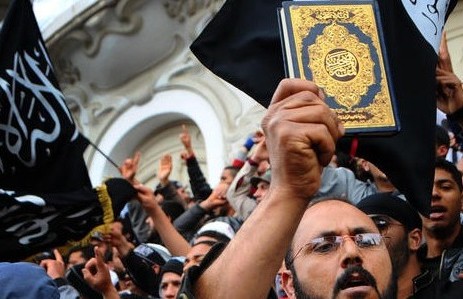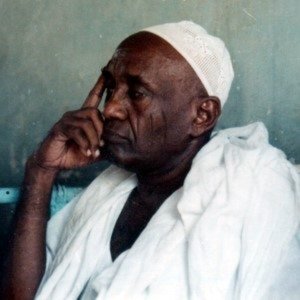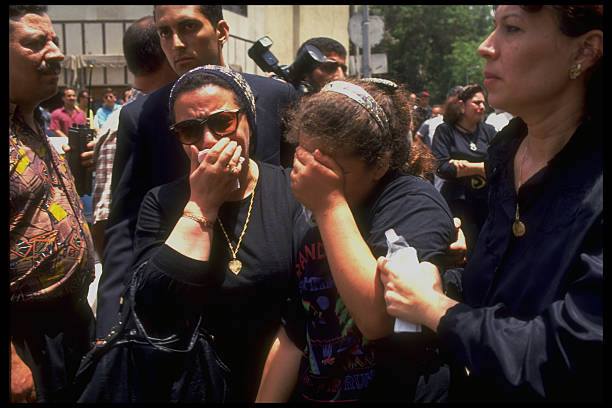
Extremist movements have become the military arm of the takfīr institutions, and they even pressure these institutions to grant them fatwās against their enemies. In some of the worst and most dangerous cases, these groups have succeeded in directing both the religious and political establishments to achieve their goals.
THIS HAPPENED, for example, in Sudan in 1985, where the victim was Shaykh Mahmoud Muḥammad Ṭaha.[1] President Numeiri had decided to move from the socialist camp to the Western camp, and in order to placate the people rebelling against him he donned the robe of religion. He wanted to repeat, in the twentieth century, the story of the governor of Kufa who sought nearness to God on the day of Eid by slaughtering Al-Jaʽd ibn Dirham. Numeiri thus approached Ḥasan al-Turābī and his movement, the Muslim Brotherhood, and as a token of the sincerity of his Islam, he presented him with the execution of the apostasy ruling against a shaykh over 76 years in age, in accordance with a takfīrī fatwā issued against him 17 years previously.
Traditionalist clerics failed to notice the danger of moving from takfīr as a documentary tool of intimidation to takfīr as an executive pronouncement. They may instead have felt some satisfaction with it, not realizing that the matter would one day turn against them. That day came in 1977 when the group known as Al-Takfīr wal-Hijra assassinated Shaykh Muḥammad Ḥusayn al-Dhahabī, a prominent Azharite scholar who was as loyal to the prevailing power as most traditional clerics were. Perhaps the role-sharing scheme that we mentioned came as a result of this incident and as an implicit attempt to avoid a direct and violent clash between the traditional and activist ‘Islamists’. They differed on the issue of whether to declare takfīr against rulers who did not apply the Sharīʻa, but were at one on the issue of declare takfīr against intellectuals, because that was easier and safer.
Traditionalist clerics failed to notice the danger of moving from takfīr as a documentary tool of intimidation to takfīr as an executive pronouncement.
It seems that we have entered a third phase since the start of this twenty-first century, particularly following the September 2001 bombings. It is a phase in which the initiative is with what the traditional clerics themselves term the ‘takfīrī movements’. These movements, which represent religious far right wing, no longer feel the need to refer to the traditional clerics, but instead bypass them and accuse them of negligence. They view them with the same eye that Shaykh al-Dhahabī viewed them, due to their relations with the Sultan authorities and their preference for banquets in hotels over jihād in the trenches.
The traditional clerics tried to discourage those groups from attacking the Gulf countries – the financial backers of the clerics – or attacking Britain that guarantees their residency, their meetings, and their assets. Had they been consulted before the 2001 bombings, they would have been among those who opposed it, aware of the bad consequences that it would have for their interests. But they did not succeed in doing anything of the sort. The takfīrī groups now have their own scholars and muftīs, and they act independently of them, with their own takfīrī rulings and committees.
This development is undoubtedly injurious to the interests of the traditional clerics since it presents a strong competition to their role and openly encroaches upon their social standing. Their situation is akin to the case of official merchants when faced with black market traders who cause them losses, each wanting to control resources and the sources of goods, where in this case the commodity is the takfīr of human beings. But if the market gets flooded with takfīrī fatwās with no controls on supply and demand, this will only lead to the bankruptcy of these major merchants.
Takfīr in the modern era is a crime, and the crime requires the enactment of legislation to punish it.
In saying this we do not deny that the traditional clerics are mostly pacifist in nature (notwithstanding the violence of their discourse) since the experience of centuries of exercising moral authority has taught them that what is not fully comprehended is not fully abandoned either. As we said, they tend not to overdo it in actual takfīr and do not feel a real desire to transform their takfīrī fatwās into executive rulings. The problem today is that the muftī who issues a fatwā just to clear his conscience no longer controls the consequences of his fatwā and in fact may become responsible for violent operations for which he will be held accountable. Indeed, issuing fatwās has become a dangerous and exhausting profession, when once it was an easy job that brought abundant profits to its practitioner.
Takfīr in our societies is a full-time profession such as agriculture, engineering and medicine, but with the difference that societies have active need for the farmer, the engineer and the doctor, but do not, in point of fact, need hundreds of practitioners of takfīr who know no other profession than it. The issue today is not that we place some order on this parasitic profession and review the control mechanisms of takfīr with the aim of mitigating it, but that we question its legitimacy and the permissibility of takfīr in the first place.
Almost all religions have abandoned takfīr: Buddhism and Hinduism did not experience this beyond some short periods of their history, Judaism decided centuries ago to associate it with birth and not with belief, Protestantism completely abandoned takfīr in the eighteenth century. Catholicism is the most conservative of religions other than Islam, and still retains the penalty of excommunication from the Church, but today this punishment no longer holds consequences for people’s lives or their personal property, and it only applies to clergymen who, when expelled from the Church are to return to the status of ordinary citizens in society. Islam remains the only religion that retains the sword of takfīr to wield power over people, with all of its dangerous social consequences such as murder, the forcible divorce of spouses, the deprivation of inheritance, and so on. This is the crux of the matter. The objection is not about classifying people as ‘infidels’ and ‘believers’ (although this classification is stupid and meaningless since every believer is an infidel from the point of view of another faith); the objection is to the criminal consequences of takfīr, since it is an issue that entails the killing and assaulting of other people.
Why is the Muslim not granted the same freedom of thought and study, and why is he treated as a minor,
Can modern societies accept this situation? All religious and positive laws consider criminalization as the consequence of a crime, and takfīr is no exception, whether its application mechanisms are strict or mitigated. Takfīr has nothing to do with high treason, which some modern legislation considers a crime requiring the death penalty. There is no relationship, for example, between belief in angels and demons and loyalty to the homeland or betrayal of it. Takfīr is not a pre-requisite for preserving identity – how miserable this identity has to be if it is based on such beliefs and is imposed on people through violence and intimidation. Takfīr in the modern era is a crime, and the crime requires the enactment of legislation to punish it. This is what is required today in all Arab and Islamic societies. The use of takfīr should be prohibited by the force of law, whose primary function is to protect individuals, their lives and property. The perpetrators of this crime should be treated as murderers and terrorists.

Suggested Reading
Modern societies are societies of thinking (tafkīr), not societies of takfīr. Each person has the right to freedom of thought and expression so long as he does not transgress the rights of others. There may be differences in sensibilities, right wing and left wing, religious and secular, traditional and modernist, all of which offer their intellectual ideas and projects. No one imposes them on anyone, and no one is made to choose between them with the sword of takfīr hanging over them or the complex of ‘sin’ paralysing their natural gifts. If I visit any library in the West, I will see the books of the atheist existentialist Sartre, the right-wing Raymond Aaron, and the believer poet Paul Claudel, all classified according to their specialization, not according to their faith, and all presented to the reader’s choice without any barriers.
Why is the Muslim not granted the same freedom of thought and study, and why is he treated as a minor, with the jurists telling him that which constitutes disbelief and true belief, or that which lawful and that which is forbidden?
The law does not force anyone towards disbelief nor towards belief, and it must protect all of us from any attacks on our life, our person, and our property. That which is causes the crime must be considered a crime, and it is high time for us to start shifting from a takfīr society towards a thinking society. The contribution that traditional clerics can make to help achieve this goal is to issue a fatwā that unanimously outlaws fatwās of takfīr, whatever the motive adduced for them.
[1] On this case, see Almuslih article: On the punishment for Apostasy. (Ed.).
See Part 1 of this essay here


